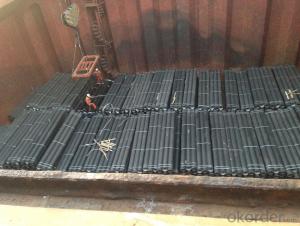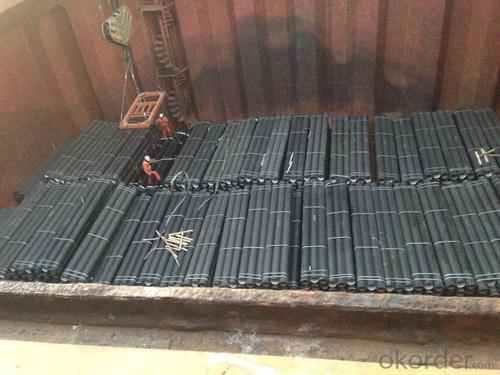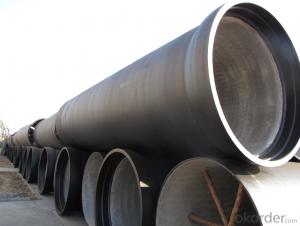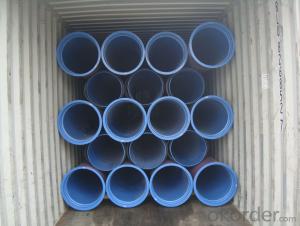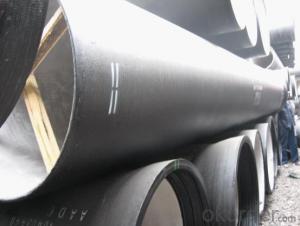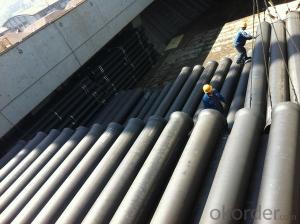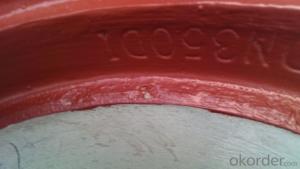T Type Ductile Iron Pipe K8 DN500 socket spigot pipe
- Loading Port:
- Tianjin
- Payment Terms:
- TT OR LC
- Min Order Qty:
- 25 m
- Supply Capability:
- 30000 m/month
OKorder Service Pledge
OKorder Financial Service
You Might Also Like
1) The standard of pipe: ISO2531:1998, EN545:2006,K9 K8
2) Effective length: 6m/5.7m
3) Inner cement line: Portland cement lineas per ISO4179
4) Zinc coating: at least 130g/m2 as per ISO8179
5) Bitumen painting: at least 70μm as per ISO8179
6)With 102% quantity of NBR, SBR, or EPDM ring asper ISO4633
7) DN80-DN1200
8) Highstrength, lighter than grey iron, good corrosion resistance, no furring, smallflow resistance, easy fixing, long life tome about 100 yeas
9)Checked by automatic inspection equipment
10) Composition:
Chemical composition | |||
Chemical composition | Ductile Cast Iron Pipe (%) | Grey iron pipe (%) | Steel pipe (%) |
C | 3.5-4.0 | 3.2-3.8 | 0.1-0.2 |
Si | 1.9-2.6 | 1.4-2.2 | 0.15-0.4 |
Mn | 0.15-0.45 | 0.4-0.6 | 0.3-0.6 |
P | ≤0.06 | ≤0.3 | 0.02-0.03 |
S | ≤0.02 | ≤0.1 | 0.02-0.03 |
Mg | 0.03-0.06 |
|
|
11) Feature:
Mechanical properties | |||
| Ductile Cast Iron Pipe | Grey Iron Pipe | Steel Pipe |
Tensile Strength(Mpa) | ≥420 | 150-260 | ≥400 |
Yield Strength(Mpa) | ≥300 | No Confirmation | No Confirmation |
Bending Strength(Mpa) | ≥590 | 200-360 | ≥400 |
Elongation (%) | ≥10 | Neglected | ≥18 |
Brinell Hardness(HBS) | ≤230 | ≤230 | About 140 |
12) T type mechanical joint
13) Packing: in bulk or container
PACKING: 1) Pipesare bundled together with the steel belt.
2) Wooden pieces are put between the pipes.
- Q: What are the specifications of cast iron pipes?
- The nominal diameter of the continuous grey cast iron pipe is 75~1200 mm. It adopts the form of socket type or flange disk interface. It can be divided into two kinds of flexible interface and rigid interface according to function. The length of the straight pipe is 4 meters, 5 meters and 6 meters. According to the wall thickness, LA, A and B are divided into three grades. The nominal diameter of the centrifugal cast iron pipe of the sand mould is 200~1000 mm, the effective length is 5 meters and 6 meters. According to the wall thickness, it is divided into two grades: P and G. High strength, good toughness, thin tube wall, little metal consumption, and can bear higher pressure,
- Q: What are the advantages of using ductile iron pipe over concrete pipe?
- There are several advantages of using ductile iron pipe over concrete pipe. Firstly, ductile iron pipe has superior strength and durability, with a higher resistance to cracking and breaking compared to concrete pipe. This makes it ideal for underground applications where it is subjected to heavy loads and pressure. Secondly, ductile iron pipe has a longer service life, typically lasting 50 to 100 years, compared to the 30 to 50-year lifespan of concrete pipe. Additionally, ductile iron pipe is easier to install and maintain, as it is lighter in weight and requires fewer joints. It also offers better flow capacity, reducing head loss and improving overall system efficiency. Lastly, ductile iron pipe is more resistant to corrosion, ensuring long-term reliability and reduced maintenance costs.
- Q: How are ductile iron pipes tested for quality?
- Various methods are employed to test the quality of ductile iron pipes, ensuring they meet required standards and specifications. One commonly used test is the hydrostatic pressure test, wherein the pipes are subjected to high-pressure water or other liquids to detect leaks or weaknesses. Water is typically used to fill the pipes, with the pressure gradually increased to a predetermined level. This test effectively identifies potential defects that could compromise the pipes' integrity. Another important quality test for ductile iron pipes is the tensile test. This involves pulling a sample of the pipe until it breaks, measuring the applied force and elongation. By doing so, the pipe's tensile strength and ductility can be determined, ensuring it can withstand required loads and stresses without deformation or failure. In addition to these tests, other quality checks include visual inspection, dimensional checks, and surface defect examinations. Visual inspection involves scrutinizing the pipes for visible defects like cracks, voids, or surface irregularities. Dimensional checks ensure the pipes meet specified dimensions and tolerances. Furthermore, ductile iron pipes often undergo corrosion resistance tests. This entails exposing the pipes to corrosive environments such as saltwater or acidic solutions to evaluate their resistance to corrosion. This is vital in determining the pipes' durability and longevity, particularly in harsh conditions. Overall, ductile iron pipes undergo rigorous testing to ensure their quality and performance. These tests guarantee that the pipes meet required standards, are safe for use, and can withstand anticipated loads and environmental conditions in their intended applications.
- Q: What is the ductile cast iron pipe
- Have not heard of the nodular cast iron pipe pipe, ductile iron may be a tube or a certain short tube is referred to as excellent grade.
- Q: What is the minimum cover requirement for ductile iron pipes?
- The specific project or engineering design considerations typically determine the minimum cover requirement for ductile iron pipes. However, as a general rule, it is often recommended to have a minimum cover requirement of at least 2 feet (or 0.6 meters) from the top of the pipe to the finished ground surface. This recommendation helps protect the pipe from external loads, soil settlement, and potential damage during construction activities. Additionally, it contributes to the long-term structural integrity and durability of the ductile iron pipe system. It is crucial to consult local building codes, industry standards, and project specifications for accurate and up-to-date information on specific minimum cover requirements.
- Q: What are the different joint types available for ductile iron pipes?
- Ductile iron pipes offer various joint types that are essential for maintaining the integrity and reliability of the pipeline system. 1. The push-on joint is the most prevalent joint used for ductile iron pipes. It involves inserting a rubber gasket into the bell end of the pipe and then pushing the spigot end into the bell, ensuring a tight seal. This joint is easy to assemble, quick, and has excellent resistance against soil movement and water pressure. 2. The mechanical joint involves a gland and follower that are secured around the spigot end of the pipe using bolts and nuts. It provides a robust and durable connection and is commonly used for larger diameter pipes or applications that expect higher pressure or thrust loads. 3. Flanged joints are utilized when connecting pipes to other components like valves or fittings. The pipe ends are machined and equipped with flanges that are bolted together using gaskets, ensuring a secure connection. These joints find frequent use in industrial applications or situations requiring frequent disassembly. 4. Restrained joints are designed to withstand significant external forces and prevent separation or pulling apart of the pipe. They typically combine mechanical joint components, such as bolts and glands, with additional restraining elements like welded or bolted-on restraints. These joints are commonly employed in high-pressure applications or situations where substantial external forces are present. Choosing the appropriate joint type is crucial and depends on factors such as pipeline design, operating conditions, and installation requirements. Seeking guidance from experienced engineers or pipe manufacturers can aid in determining the most suitable joint type for a specific ductile iron pipe application.
- Q: Can ductile iron pipes be used in earthquake-prone areas?
- Yes, ductile iron pipes can be used in earthquake-prone areas. Ductile iron is a strong and flexible material that can withstand the ground movement and vibrations caused by earthquakes. It has excellent ductility, meaning it can deform without fracturing or breaking under stress. This property allows ductile iron pipes to absorb the energy generated during an earthquake, reducing the risk of pipe failure or rupture. Additionally, ductile iron pipes have been successfully used in seismic zones for many years, proving their resilience and reliability in such areas. However, it is important to note that proper installation and design considerations, such as using appropriate jointing methods and ensuring proper anchoring, are essential for ensuring the performance of ductile iron pipes in earthquake-prone areas.
- Q: How long do ductile iron pipes last?
- Ductile iron pipes possess an impressive durability and extended lifespan. Typically, these pipes can endure from 80 to 100 years, with certain instances even reaching an impressive 150 years. The exceptional longevity of ductile iron pipes can be attributed to their sturdy construction, enabling them to withstand high-pressure surroundings, combat corrosion, and endure severe weather conditions. Furthermore, ductile iron pipes have established a commendable reputation for their reliability and performance, rendering them a favored option for water and wastewater infrastructure projects worldwide. By conducting regular inspections and implementing maintenance measures, the lifespan of ductile iron pipes can be further prolonged, assuring their continued service for numerous decades to come.
- Q: Can ductile iron pipe be used for municipal water supply?
- Indeed, municipal water supply systems have extensively relied on ductile iron pipe for numerous years, owing to its exceptional durability, strength, and corrosion resistance. Its suitability for underground use is evident in its ability to endure high pressure and substantial loads. Moreover, ductile iron pipe boasts an extended lifespan, often surpassing 100 years, making it a fiscally prudent option for municipal water supply systems. In summary, ductile iron pipe serves as a dependable and prevalent material for guaranteeing the secure and effective transportation of water to communities.
- Q: Can ductile iron pipes be used in mining applications?
- Yes, ductile iron pipes can be used in mining applications. Ductile iron is known for its high strength and durability, making it suitable for use in demanding environments such as mines. These pipes have excellent resistance to corrosion, which is essential when dealing with water or other liquids that may contain chemicals or minerals. Additionally, ductile iron pipes have good impact resistance, making them capable of withstanding the rough conditions often found in mining operations. They are also easy to install and maintain, allowing for efficient and cost-effective use in mining applications. Overall, ductile iron pipes are a reliable choice for transporting water, slurry, or other substances in mining operations.
Send your message to us
T Type Ductile Iron Pipe K8 DN500 socket spigot pipe
- Loading Port:
- Tianjin
- Payment Terms:
- TT OR LC
- Min Order Qty:
- 25 m
- Supply Capability:
- 30000 m/month
OKorder Service Pledge
OKorder Financial Service
Similar products
Hot products
Hot Searches
Related keywords
